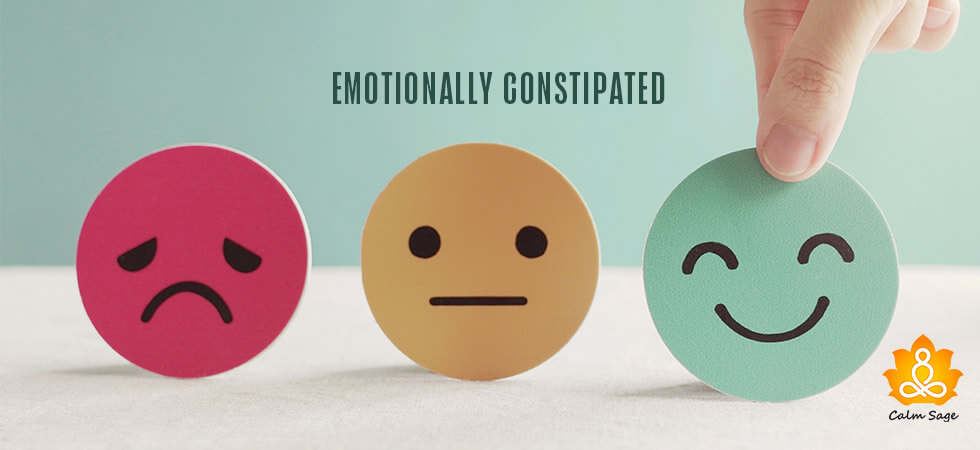Are You Emotionally Constipated? 10 Signs To Know And How To Cure It

Emotions are complicated, aren’t they? Sometimes, expressing them isn’t difficult but other times, you simply can’t or won’t want to express them or even process them. This inability or unwillingness to process, accept, and express emotions can be called “emotional constipation”.
I know that you must find this term quite odd, however, emotional constipation is one of the most accurate terms to describe your bottled-up emotions.
This emotional constipation can be a serious barrier when it comes to connecting with oneself (and others) emotionally. Since you’re unable to identify, process, accept, and express your real emotions, you can’t communicate with your loved ones and put your point across. This may also cause severe miscommunication in your relationships as well as professional relationships.
Emotional connectedness is important and with the right tools, you can cure emotional constipation. Let’s take a look at what is emotional constipation, what may cause emotional constipation, and how you can cure emotional constipation as well as let go of your emotional stress.
What Is Emotional Constipation?
Emotional constipation is the unwillingness and inability to process, embrace, and express your real and raw feelings or emotions. When you’re emotionally constipated, you may give off a cold and indifferent vibe or energy. Repressed or unprocessed emotions if left unaddressed can fester and turn into emotional, mental, and physical wounds.
Emotions help us ensure that our basic needs are fulfilled. And trust me, you’re not alone who can’t (or won’t) express your emotions. How you feel is important to address and accept as bottled-up emotions can often lead to conditions such as high blood pressure, headaches, insomnia, depression, and more.
Let’s take a look at some of the common symptoms of emotional constipation below.
The Symptoms Of Emotional Constipation
Here are some common emotional constipation symptoms and signs that you should know about:
1. Headaches
If you constantly struggle with stress headaches or migraines, then you know how painful they can be. Most of the time, migraines are caused by physical reactions but some headaches can be caused by your unprocessed and repressed emotions. When you don’t (or can’t) release the feelings, they can become stifling and manifest as physical symptoms such as headaches and migraines.
2. Emotional Numbness
When you keep repressing your emotions, eventually, you become all but numb to the world around you. This can also make you less empathetic towards others. More often than not, your normal reaction to good or bad news is “meh”. Instead of empathizing, you become indifferent. Since you can’t identify with emotions, you might not feel emotional anymore and even disassociate.
3. Insomnia
Unprocessed emotions need to be freed and when they aren’t, they can cause quite a ruckus. When you’re not consciously trying to repress your raw emotions, thoughts, and feelings, they can manifest themselves mentally and physically, causing insomnia or other sleep disorders.
Not only trouble falling asleep, but emotional constipation can also cause other disturbances such as nightmares, frequent night terrors, etc.
4. Anxiety Or Panic Attacks
Unaddressed emotional constipation can’t go away on its own. When left unaddressed, they can fester until the energy has nowhere to go but in the form of anxiety attacks or panic attacks. If you can healthily channel the repressed energy, good but if you can’t, then that energy will channel itself into anxiety and panic attacks.
5. Emotional Outbursts
Imagine coming home from a rough day at work and seeing unwashed dishes in the sink. What you may experience can be a strong emotion that can make you feel angry and in retaliation, you may either throw a tantrum and cry or break the dishes in rage. This kind of emotional outburst can also be an emotional constipation symptom that you should not ignore.
6. Restless Leg Syndrome
Again, repressed emotions build restless energy that needs to be released. Most of the time, these repressed emotions may manifest as restlessness or restless leg syndrome. In this condition, you may subconsciously twitch or bounce your legs. Restless leg syndrome is a way to simply release the unprocessed energy and while it isn’t serious, it can be quite uncomfortable.
7. Unhealthy Distractions
It’s way easy to ignore your emotions by using distractions and unhealthy coping mechanisms. Anything to take your mind off of your emotions, right? Most of the time, these distractions are something that just takes our full attention and gives us an excuse to not think or feel.
You may prefer doomscrolling or binge-eating while others may use work or shopping as a distraction. While they may offer temporary relief, these activities can end up causing more harm than good.
8. Social Isolation
No one wants to be triggered into stress and to think about emotions or thoughts they don’t want to willingly face. And to avoid this, social isolation may seem like a good solution. If you’re not meeting anyone, then you’re not obligated to open up to anyone about your repressed feelings.
I mean, if you keep avoiding your unpleasant feelings or emotions, they may not even exist, right? Well, this pretense can comfort you for a while but at the end of the day, it’ll only cause more harm and lead you to develop conditions such as agoraphobia.
9. Monoemotional
Monoemotional means when you only have one emotion to all events. Normally, people have different emotional responses to different events, ranging from anger and frustration to joy or happiness. But when you’re emotionally constipated, you often have only one emotional response to different events.
10. A Lack Of Empathetic Response
When you’re emotionally constipated, you often end up having little to no empathetic response. You become so used to repressing your emotions that you develop a low tolerance for those who express their emotions healthily. You may even label them as “too sensitive” to express their emotions. This may eventually lead your loved ones to separate from you and hide their feelings and thoughts from you.
The Causes Of Emotional Constipation
For most of us, hiding our emotions in recent times makes sense, especially those emotions that are too raw or too “shameful” to express out loud. These emotions can be depression, anxiety, stress, rage, grief, disappointment, etc. Other times, many people can even be afraid of expressing positive emotions such as intimacy, affection, and happiness because they fear judgment from others.
Most of the time, the stress of holding in emotions can manifest as unhealthy addictions or coping mechanisms. Emotions are meant to be felt and feelings are meant to be expressed. Not doing this can be unhealthy not only for your mind and body but also for your soul.
When you can’t express your emotions, you might also not be aware of what you’re feeling. Emotional constipation can happen to anyone, anytime. However, emotional constipation can be more commonly experienced by people who’ve had a traumatic experience or are struggling with post-traumatic stress disorder (PTSD), and even those who have never learned how to be self-aware of their emotions.
How To Cure Emotional Constipation?
You can release your repressed emotions and cure emotional constipation when you follow these effective ways:
1. Try Physical Exercises
One of the best ways to cure emotional constipation is through physical exercise. When you’re physically active, it allows you to release the repressed energy that has gathered in your body. The best way to release unprocessed emotions is to go on a run. Some people also find boxing, yoga, or tai chi to release their feelings.
2. Try Emotional Catharsis
Another best way to cure emotional constipation is to try emotional catharsis. Many people find yelling into their pillow or letting out a scream works best. This kind of emotional catharsis can be a healthy way to release repressed emotions. Or if you’re not fond of screaming, you can try journaling to let out your frustrations.
3. Try Massage Therapy
Massage therapy is another way to cure emotional constipation as your unprocessed emotions can manifest as physical aches and pains. When your emotions are trapped in your body, they can become uncomfortable and cause physical distress. With massage therapy, you can release your stress as well as soothe the aches and pains. Keep in mind that massage therapy should be administered by a professional and trained therapist.
4. Seek Professional Help
Other than the above-mentioned ways, you can also consult a mental health professional to learn how to release unprocessed emotions and cure emotional constipation. A trained and professional therapist can help you identify your emotions, and come up with healthy ways to accept or embrace those emotions that you may find too uncomfortable.
Talkspace

- Certified and experienced counselors
- Affordable and various monthly subscription
- Also provides medication management services
- Users can pick the therapist of their match
If you or someone you know are struggling with these symptoms of emotional constipation, then you can either seek professional help or incorporate the above ways to cure emotional constipation.
Remember, unprocessed emotions can manifest as mental, emotional, and physical discomfort. Emotional constipation can be uncomfortable but not hard to treat. With the right support, you can treat emotional constipation and learn to let go of the emotional stress that comes with it.
I hope this article helped you understand what emotional constipation is, the causes, emotional constipation symptoms, and how you can cure emotional constipation. For more, you can write to us at info@calmsage.com or DM us on social media.
You can also share your thoughts and tips with us in the comments section below!
Take Care!
Next Read:




















